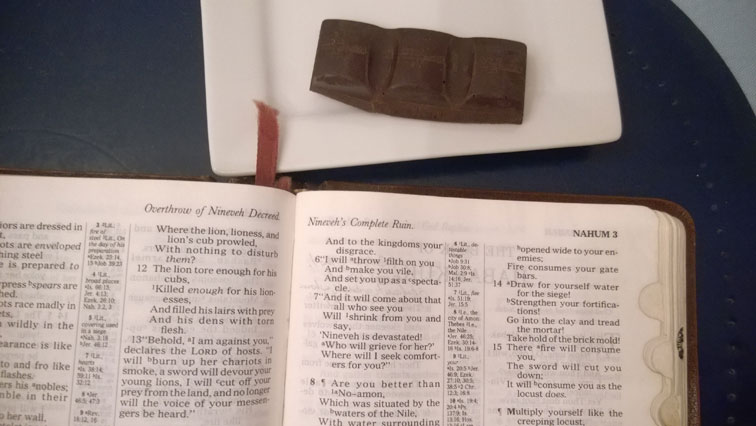
Today’s Chocolate: Endangered Species 88% Cocoa Dark Chocolate
Today’s Passage: Nahum 3
I’ve had something on my mind since we first cracked open the book of Nahum. While searching for resources on the chronology of Nahum relative to Jonah, I found a blog post accusing Nahum of vehement xenophobia. It asserted that Jonah, with its more sympathetic and merciful tone, was written as a response to Nahum. So, throughout the book, I found myself wondering: is Nahum a hate book?
Having read through it, I wouldn’t call it a hate book any more than I’d say the same of the other minor prophets. It’s true that Nahum uses potent, aggressive images and vivid scenes to paint his picture of judgment. Heck, the final chapter begins by plunging us back into the anarchy of siege and chariots: “The noise of the whip, the noise of the rattling of the wheel…horsemen charging, swords flashing, spears gleaming, many slain, a mass of corpses!” (2-3). But Israel has lived under the thumb of Assyrian rule, embodied in Assyria’s capital city, for far too long, and Nahum’s desire to see justice carried out on earth strikes me as earnest and reasonable. He doesn’t want to see evil rewarded in this life, and his belief in God’s goodness gives him confidence that Nineveh’s violence and brutality have marked it for a catastrophic end.
No, I don’t think you can make a case for Nahum denigrating the subjects of his prophecy on the basis of nationality. I’m much more concerned with the question: is Nahum sexist?
That’s right. Sexist.
I didn’t flinch when Nahum called the Assyrian nation a harlot. It’s common for prophets and other biblical figures to use prostitution as an analogy for sin: cheapening God’s good design, intended to cultivate intimacy and healthy pleasure, by turning it into a one-time commercial transaction for personal gain. But then Nahum states,
“Behold, I am against you,” declares the Lord of hosts;
“And I will lift up your skirts over your face,
And show to the nations your nakedness
And to the kingdoms your disgrace.
I will throw filth on you
And make you vile,
And set you up as a spectacle.” (5-6)
Whoa. That’s savage humiliation. The actual physical act of subjecting a woman, even a prostitute, to public humiliation by stripping her naked would be unacceptable according to the ethical principles of the Law. It’s a horrible and cruel punitive measure, so why would Nahum use it as an analogy for justice? He even puts these words into the mouth of God, but I find it hard to conceive of God saying a thing like this.
He then takes a jab at the Assyrians, who will find themselves crippled and weakened after the coming siege. “Behold, your people are women in your midst” (13), he declares. And I could make remarks about context and the cultural role of women in the ancient world, create distinctions between “strong femininity” and “weak femininity” or some such argument to try to get Nahum off the hook, but I won’t. I’m not comfortable with this. I’m not expecting an easy resolution, I’m prepared to keep looking for answers even as I go forward through the minor prophets, but I’m still not comfortable with this.
And of course I don’t go into this expecting the Bible to make me feel comfortable. That’s why I eat the chocolate.

In other, chocolate-related news, Kroger had a sale on Endangered Species chocolate bars, so over the next few eons–nay, millennia–we are going to be eating some serious Endangered Species. We may even manage to crank out some new chocolate reviews! Keep your eyes out for weekend updates, and remember, you can get early chocolate-review access and more by pledging to my Patreon.
The context is God talking through Nahum *to* the Assyrians. The ones whose god is their own strength. (Not as in “God is my strength” but who worship their own strength and their possessions that make them strong, like horses and swords.)
So to them, weakness is abominable. Calling them women and shaming them as women is what they would hate most. So, even though we admire and love and honor the “weaker sex”, the Assyrians did not. Even though God loves women and would not treat them so, the Assyrians *do* treat them this way, especially foreign women when they take over their cities. God is threatening them with basic morality: you will be treated the way you treat others.
It’s about what works as a threat of evil things done to them for the wrong they have done.
LikeLike
Hmmm, while not too off base, those whose “god is their strength” were the Chaldeans of Hab 1:11. The Assyrians were proud of theirs, too, in Is 10:13.
LikeLike